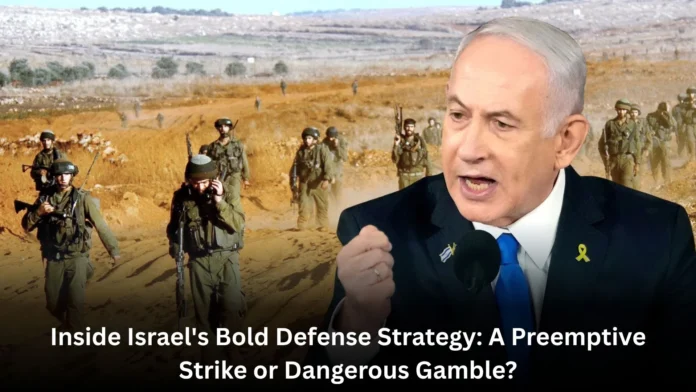Israel’s Bold Defense Strategy: When Deterrence Hits Home
Stress crackles like electricity across the Middle East. One seemingly inconsequential strike. One response. Only tomorrow’s silence—or chaos—will tell which dominates.
Is Israel on the brink of seizing control—or tumbling into an all-out regional conflict?
What’s at Stake? Iran’s Nuclear Program as a Global Flashpoint
Israel’s two‑day precision barrage—targeting military installations, leading nuclear scientists, and even a major gas extraction facility—was a calculated escalation aimed squarely at curbing Iran’s nuclear ambitions. According to Iranian state officials, 78 people were killed in the raid, including scientists crucial to their atomic efforts. In response, Iran fired missiles toward Israel, killing at least three, though the US successfully intercepted several strikes.
Storytelling moment: One unnamed Iranian nuclear researcher, saved by minutes thanks to a delayed train, now faces deportation from his hometown while grappling with the psychological fallout of clandestine life. The human heart of this conflict runs deep.
Self‑Defense vs. International Law: Where Does It Stand?
Australia’s Foreign Minister Weighs In
Senator Penny Wong—Australia’s Foreign Minister—acknowledged Israel’s right to defend itself but pressed for restraint, focusing not on legality but on broader geopolitical risk.
“Israel has a right to self‑defence… The question here is what do we do now?” Wong said during an interview, urging both sides toward de-escalation through diplomacy.
Wong relayed her warnings to Iran’s foreign minister directly, highlighting that unchecked retaliation threatens the entire region—an appeal backed by global powers aiming to maintain nuclear deal frameworks.
The Gray Zones of International Norms
The lines between self-defense and aggression blur when surprise strikes hit nuclear sites outside declared war zones. Some international law scholars argue that targeting scientists and civilian-linked infrastructure raises serious legal and ethical questions, even if the intent is to stave off greater threats.
What’s Happening Now—and What Comes Next?
A Region on the Edge
Diplomatic talks between Iran and the US regarding nuclear restrictions were abruptly halted. Simultaneously, discussions on the Israeli‑Palestinian two‑state framework have been shelved—pushed out by escalating tensions. Senator Wong described the situation as “perilous” and “very risky.”
Real‑Time Impact on Lives
Australian citizens in both Iran and Israel face immediate risks. The Australian Department of Foreign Affairs has established a dedicated 24-hour consular hotline, advising nationals to shelter in place. Airspace over the conflict zone is closed indefinitely.
For families on both sides, every siren raises questions: Is this war—or just another cycle in a decades‑old standoff?
Why Israel Launched the Strike
Neutralizing a Nuclear Threat
For Prime Minister Benjamin Netanyahu, preventing Iran from building military-grade nuclear weapons isn’t just strategic—it’s existential. Israel’s tech‑driven military capabilities enable pinpoint strikes, but this comes with peril: any mistake could spiral into a broader confrontation.
Domestic Calculus Meets International Pressures
Netanyahu’s strongman stance bolsters his domestic standing. Yet, he also risks alienating international allies—including the US—who, despite supporting nuclear compliance, worry about upsetting fragile Middle East balances.
Can Diplomacy Still Pull Us Back From the Brink?
Voices for Ceasefire
Australia, the UN, the EU, and other global actors are pushing for dialogue. Senator Wong’s message—“exercise restraint, return to diplomacy and dialogue”—echoes throughout diplomatic corridors.
Roadblocks Ahead
However, mutual distrust looms. Iran, stung by unexpected strikes, pledges further response. Israel maintains it’s building deterrence. With two-state talks on hold, momentum toward any peace process has evaporated—for now.
What This Means for You and the World
Global Markets and Security
Oil and natural gas markets spiked immediately after the strikes. The focus on gas facilities underscores that nuclear fears and economic vulnerabilities are intertwined. Any escalation could unsettle global supplies and prices.
Everyday Citizens on Edge
Families in breakout nations—from Australia to Iran—face shelter-in-place orders. Military reservists are called back. The persistent fear of miscalculation or technical failure heightens anxiety.
What’s Next? Scenarios to Watch
- Rapid De‑Escalation – Renewed diplomacy, backed by international mediation, could calm tensions.
- Widening Conflict – Iran retaliates further; Hezbollah or Syria enters; risk of full-scale war increases.
- Stalemate and Cold War – Temporary cessation locks the threat in place while talks stagnate.
Final Takeaway
Israel’s bombardment of Iranian sites underscores a stark reality: sometimes, nations believe war must come before peace. But survival cannot be the only motive—or the story ends in ashes. As Senator Wong aptly put it, “What happens tomorrow matters to all peoples of the region.” The world watches—hoping diplomacy wins before another strike makes time’s ticking irrelevant.


